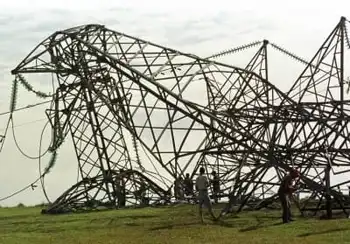Ruling Liberals rebel over Kyoto plan
OTTAWA, ONTARIO - The Liberal government is facing a growing revolt among its own party members over its plans to push environmental changes through the House of Commons.
Toronto Liberal MP Alan Tonks, chairman of the Commons environment committee, joined with the opposition parties to denounce the Liberal plans to include reforms related to the Kyoto accord in an omnibus budget bill.
The opposition parties are threatening to defeat the bill next month, which could spark an early election for the minority Liberal government.
"I don't think that this kind of brinkmanship is what the Canadian people are looking for at this particular time," Tonks said in an interview.
And former Liberal environment minister David Anderson said his fellow Liberals misjudged how the Conservatives would react to the inclusion of the Kyoto measure in the bill.
"I think this one was a mistake," Anderson said. "I thought there was going to be much closer contact between the various party House leaders. But apparently they've misjudged the opposition's criticisms."
At issue is an apparent symbolic move to delete the word "toxic" from the Canadian Environmental Protection Act.
The Kyoto environmental accord signed by Canada commits the government to reduce greenhouse gas emissions, but as yet there are no agreements with industry on setting targets.
Eliminating the word toxic would broaden the substances that could be regulated under law to include carbon dioxide, methane and four other greenhouse gases targeted by Kyoto.
Sources said yesterday that several cabinet ministers raised objections to a previous plan to declare greenhouse gases like carbon dioxide as toxic because it could open the government to ridicule, since people and animals exhale carbon dioxide as part of breathing.
More importantly, the government could expect fierce protests from the gas industry, which pipes methane or natural gas into millions of homes daily. The industry foresaw a public relations mess if its chief product was declared toxic by the federal government, even though methane is 21 times more potent than carbon dioxide in producing global warming.
The disputed environmental measures are part of a wide array of budget provisions in the bill, including the newly signed Atlantic Accord that will provide billions of dollars in additional revenues for Nova Scotia and Newfoundland.
The Liberals' criticism of their own government came as opposition leaders stepped up their campaign to force Prime Minister Paul Martin to alter his Kyoto legislative approach or face possible defeat in the Commons next month.
Conservative Leader Stephen Harper has written to Nova Scotia Premier John Hamm saying the federal Conservatives will demand as a price for keeping the government from falling that Martin rearrange the legislative package implementing the Feb. 23 budget.
The Conservatives say the Liberals are trying to force them to set aside their objections to the Kyoto measures in the budget bill or risk depriving the Atlantic provinces of revenues.
Deputy Conservative leader Peter MacKay explained that the inclusion of the Kyoto measure in the budget bill along with the offshore deal is seen by many as "unnecessarily provocative" and "puts us in a very tight spot, quite frankly."
NDP Leader Jack Layton said it's up to Martin to "get us out of the mess he's created.
"The Liberals are up to no good here," Layton said. "I see it as irresponsible and political games playing."
Liberal House leader Tony Valeri said he is not considering splitting up the budget legislation to meet opposition demands. He said the legislation contains nothing more than the items that were covered in Finance Minister Ralph Goodale's Feb. 23 budget. "The suggestion that somehow now all this has to be split out is something I find a bit surprising."
Valeri said the opposition parties appear "confused" about the government's plan to remove the word "toxic" from the environmental protection law.
Valeri denied that the Liberals are trying to "box in" the Conservatives by forcing them to choose between supporting the Kyoto measures and the Atlantic Accord in the budget vote. He said he plans to meet with opposition House leaders in the next week or so to explain the Liberals' environmental approach and "make sure that cooler heads prevail."
A vote on the budget bill is not expected until late April. The legislation introduced in the Commons last week will have to go through second and third reading and be debated at a parliamentary committee before it can be passed into law.
As well, the Liberals will next week present an overall administrative plan — including at least $2.3 billion in new programs — on how Canadian consumers and industry can help meet Kyoto emissions-reduction targets.
The Liberals hold 133 of 308 Commons seats, while the Conservatives have 99 seats, the Bloc Quebecois 54, the NDP, 19, and there are two independents and one vacancy.
Related News

Nevada on track to reach RPS mandate of 50% renewable electricity by 2030: report
CARSON CITY - Nevada is on track to meet its Renewable Portfolio Standard of 50% of electricity generated by renewable energy sources by 2030, according to the Governor's Office of Energy's annual Status of Energy Report.
Based on compliance reports the Public Utilities Commission of Nevada has received, across all providers, about 20% of power is currently generated by renewable resources, and filings show Nevada's investor-owned utility and other power providers have plans to reach the state's ambitious RPS of 50% by 2030, according to the report released Jan. 28.
"Because transportation and electricity generation are Nevada's two largest contributors to greenhouse…




